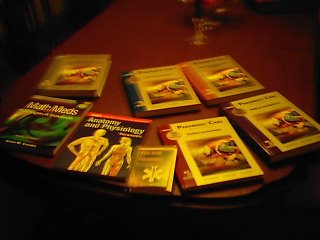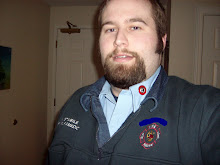It should hold
The stress of paramedic training finally reached a head. Its not that its hard, its just that there is so much of it. I have to memorize so many different things that my brain feels as thought it will leak out of my ears.
So I did what anybody would do. I took a vacation.
But my vacations are a little bit different. While I did go to Block Island with my long time girlfriend Colleen, I also took the advanced rope rescue class offered by the Mass Firefighting Academy.
Four three days I hung off of buildings on ropes that I anchored to various structures and outcroppings. I rescued fellow classmates and hauled other rescuers with the help of a pulley system.
My basic rope class served as a foundation for this class. While in the basic class, one rapelled down to the victim, the advanced class had a a complex lowering system designed to completly package an injured or unconcious patient. With the use of a Stokes basket, one can immobilize and transfer a patient to stable ground so as to continue care.
We practiced a seemingly simple yet delicate technique called slope evacuation. As the name emplies, the victim is at the bottom or on the slope itself and rescuers must secure themselves and him in order to safely traverse that slope. Through the use of a pulley and haul system, Stokes basket and a good deal of personel, the victim can be safely moved.
For three days I worked upwards of three stories above the ground, practicing these techniques and working to broaden my understanding of technical rescue. As it stands I am two classes away from acheiveing the rank of Rescue Technician, a certification I have coveted since starting in the fire service.
Instructors at the MFA have a running joke before starting each day's training. The go through a rigorous safety screening of the entire rigging system and then turn to the students and say "It should hold," and nothing more.
At the conclusion of my rope course, my girlfriend and I spent the long weekend on Block Island. It was the perfect capstone to a well needed stress relieve.
But now I am back to the grind, after spending nearly five hours memorizing anatomy and physiology, loving refered to as "That fuckin' A&P stuff again." I am going to collapse into bed.
So I did what anybody would do. I took a vacation.
But my vacations are a little bit different. While I did go to Block Island with my long time girlfriend Colleen, I also took the advanced rope rescue class offered by the Mass Firefighting Academy.
Four three days I hung off of buildings on ropes that I anchored to various structures and outcroppings. I rescued fellow classmates and hauled other rescuers with the help of a pulley system.
My basic rope class served as a foundation for this class. While in the basic class, one rapelled down to the victim, the advanced class had a a complex lowering system designed to completly package an injured or unconcious patient. With the use of a Stokes basket, one can immobilize and transfer a patient to stable ground so as to continue care.
We practiced a seemingly simple yet delicate technique called slope evacuation. As the name emplies, the victim is at the bottom or on the slope itself and rescuers must secure themselves and him in order to safely traverse that slope. Through the use of a pulley and haul system, Stokes basket and a good deal of personel, the victim can be safely moved.
For three days I worked upwards of three stories above the ground, practicing these techniques and working to broaden my understanding of technical rescue. As it stands I am two classes away from acheiveing the rank of Rescue Technician, a certification I have coveted since starting in the fire service.
Instructors at the MFA have a running joke before starting each day's training. The go through a rigorous safety screening of the entire rigging system and then turn to the students and say "It should hold," and nothing more.
At the conclusion of my rope course, my girlfriend and I spent the long weekend on Block Island. It was the perfect capstone to a well needed stress relieve.
But now I am back to the grind, after spending nearly five hours memorizing anatomy and physiology, loving refered to as "That fuckin' A&P stuff again." I am going to collapse into bed.


